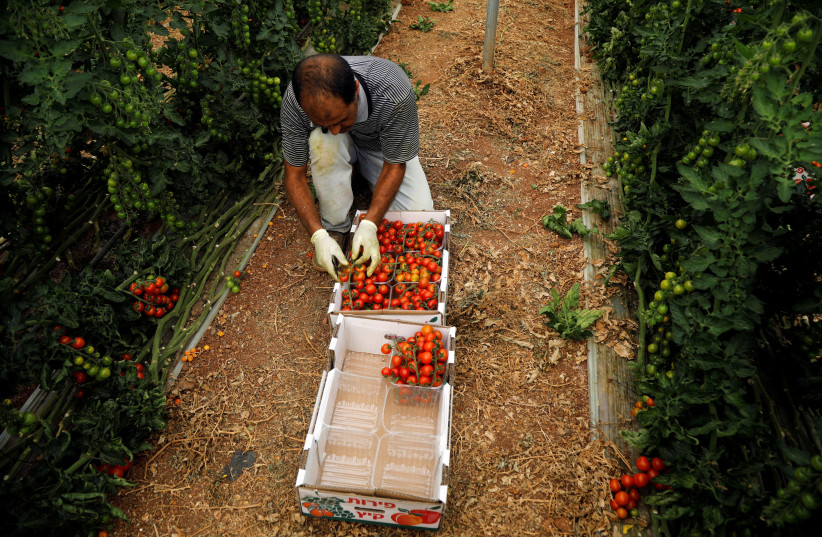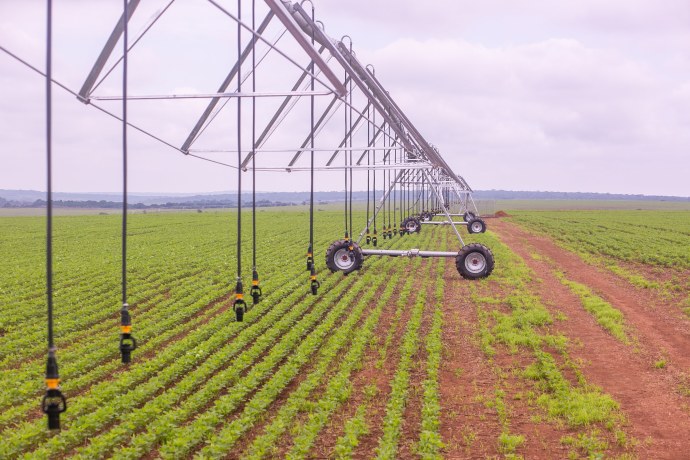Soil pollution is defined as contamination of soil at higher than normal concentrations by waste materials of human origin that have adverse effects on human and ecosystem health.
By JERUSALEM POST STAFF
Published: JULY 5, 2022 10:29

Palestinian man packs cherry tomatoes at a farm in Tubas, in the West Bank
(photo credit: RANEEN SAWAFTA/ REUTERS)
Pesticides and heavy metals in soil may have detrimental effects on the cardiovascular system, according to a study published in Cardiovascular Research, a journal of the European Society of Cardiology.
Pollution of air, water, and soil is a great and growing threat to global health. The Lancet Commission on Pollution and Health documented that pollution is the largest environmental cause of disease and premature death in the world today.
Diseases caused by pollution were responsible for an estimated 9 million premature deaths in 2015—16% of all deaths worldwide, according to the peer-reviewed study.
“Soil contamination is a less visible danger to human health than dirty air,” said author Professor Thomas Münzel of the University Medical Center Mainz, Germany.
“But evidence is mounting that pollutants in soil may damage cardiovascular health through a number of mechanisms including inflammation and disrupting the body’s natural clock,” he added.

Soil pollution is defined as contamination of soil at higher than normal concentrations by waste materials of human origin that have adverse effects on human and ecosystem health. Soil pollutants include heavy metals and toxic organic chemicals such as pesticides, biological pathogens, and plastic waste.
Soil is important for human health in a number of ways. Approximately 78% of the average per capita calorie consumption worldwide comes from crops grown directly in soil, and another nearly 20% comes from terrestrial food sources that rely indirectly on soil. Soil is also a major source of nutrients, and it acts as natural filters to remove contaminants from water.
Study results
The paper examines the relationships between soil pollution and human health, with a particular focus on cardiovascular disease.
The authors state that contaminated soil may lead to cardiovascular disease by increasing oxidative stress in the blood vessels, causing inflammation, and by disturbing the body clock (circadian rhythm).
“Although soil pollution with heavy metals and its association with cardiovascular diseases is especially a problem in low and middle-income countries since their populations are disproportionately exposed to these environmental pollutants, it becomes a problem for any country in the world due to the increasing globalization of food supply chains and uptake of these heavy metals with fruits, vegetables and meat,” the study stated.
“More studies are needed on the combined effect of multiple soil pollutants on cardiovascular disease since we are rarely exposed to one toxic agent alone," Professor Münzel said.
"Research is urgently required on how nano- and microplastic might initiate and exacerbate cardiovascular disease. Until we know more, it seems sensible to wear a face mask to limit exposure to windblown dust, filter water to remove contaminants, and buy food grown in healthy soil,” he urged.
"Research is urgently required on how nano- and microplastic might initiate and exacerbate cardiovascular disease. Until we know more, it seems sensible to wear a face mask to limit exposure to windblown dust, filter water to remove contaminants, and buy food grown in healthy soil.”Professor Thomas Münzel
No comments:
Post a Comment